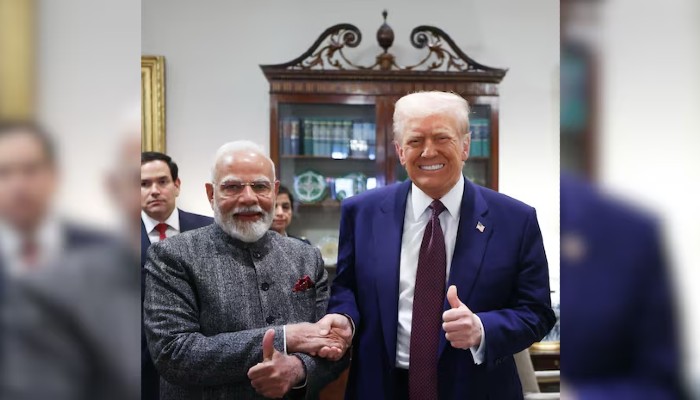India-Pakistan Talks Urged by Pakistan PM Shehbaz Amid Ceasefire Observance

Representative Image
Pakistani Prime Minister Shehbaz Sharif calls for peaceful dialogue with India over Kashmir, following a recent ceasefire after cross-border military clashes.
Pakistan PM Calls for Dialogue with India Over Kashmir After Military Clashes
Pakistani Prime Minister Shehbaz Sharif has called on India to resume peaceful dialogue to resolve longstanding disputes, including over Jammu and Kashmir, as Pakistan marked a national day of tribute to its armed forces following a recent escalation in cross-border hostilities.
Speaking on Friday evening at a national event in Islamabad commemorating ‘Youm-e-Tashakur’ (Day of Thanks), Prime Minister Shehbaz said both countries must learn from the past and move forward as peaceful neighbours. The ceremony honoured the Pakistani military's response during a four-day confrontation with Indian forces earlier in May.
“Pakistan and India have fought three wars and achieved nothing,” Prime Minister Shehbaz said during his address at the Pakistan Monument. “The lesson is to sit down as peaceful neighbours and settle all outstanding issues, including Jammu and Kashmir. Without resolution, there can be no lasting peace in this region.”
The recent spike in tensions followed a deadly attack on April 22 in India’s Pahalgam region, in which 26 people were killed. India responded with a series of targeted strikes on what it described as militant infrastructure in Pakistan under "Operation Sindoor". The operation triggered a cycle of retaliatory actions, with Pakistan attempting to strike Indian military bases from May 8 to 10. Indian forces launched counter-attacks on multiple Pakistani military sites.
De-escalation Agreement
A ceasefire agreement was reached on 10 May, bringing an end to several days of missile and drone strikes. Prime Minister Shehbaz expressed gratitude to international partners for their efforts in de-escalating the conflict, singling out United States President Donald Trump for what he called “an active role” in helping secure the ceasefire.
The prime minister’s call for renewed talks comes as India maintains a firm stance on bilateral negotiations, stating that any future discussions must centre on the return of Pakistan-administered Kashmir and the issue of cross-border terrorism.
“If peace comes, we can also cooperate in counterterrorism,” Shehbaz added, signalling openness to broader regional cooperation should tensions ease.
National Observance and Military Tributes
‘Youm-e-Tashakur’ began with a 31-gun salute in the capital, Islamabad, and 21-gun salutes in provincial capitals, according to state broadcaster Radio Pakistan. Across the country, citizens took part in rallies and prayer services in support of the armed forces.
Earlier in the day, the prime minister raised the national flag at the Prime Minister’s House in Islamabad and reiterated Pakistan’s commitment to peace. However, he warned that the country would not hesitate to defend itself when necessary.
“Pakistan is a peaceful country, but it reserves the right to give a befitting response in its defence,” he said, referring to the recent clashes as a “golden chapter” in the country’s military history.
In a show of solidarity with the military, Prime Minister Shehbaz also visited the home of Squadron Leader Usman Yousaf, who was killed during the Indian strikes, to offer condolences to his family. He was accompanied by Defence Minister Khawaja Asif, Army Chief General Asim Munir, and Information Minister Attaullah Tarar.
Later, he toured Rawalpindi’s Combined Military Hospital to meet with soldiers and civilians wounded in the recent hostilities. “The way the Pakistan armed forces and the entire nation fought this war is unparalleled,” he said.
President Asif Ali Zardari, in a separate statement, reiterated that “Pakistan will never compromise on its sovereignty, territorial integrity and core national interests”.
Context
The Kashmir region remains a longstanding flashpoint between India and Pakistan, both of which claim the territory in full but administer parts of it. Since gaining independence from British rule in 1947, the two nuclear-armed neighbours have fought multiple wars, with Kashmir at the heart of their disputes.
Efforts to restart bilateral dialogue have repeatedly stalled, often derailed by incidents of violence or political shifts on either side. Despite the recent military de-escalation, diplomatic relations remain strained.
Analysts say Prime Minister Shehbaz’s remarks could signal a willingness to pursue renewed diplomatic engagement, but any progress will depend on whether both sides can agree on the terms and scope of dialogue.
As tensions linger, international observers continue to call for restraint and renewed efforts at conflict resolution to ensure long-term peace in the region.

India Revokes Celebi Aviation Security Clearance Amid Turkey-Pakistan Ties
India cancels security clearance of Turkish firm Celebi Aviation over national security concerns following Turkey’s support for Pakistan in Operation Sindoor.
|2025-05-16

India-US Trade Deal: Trump Claims ‘Zero Tariffs’ as Jaishankar Urges Caution
US President Donald Trump claims India offered zero tariffs on American goods. India responds, calling the remarks premature amid ongoing trade negotiations.
|2025-05-16

Adani Airport Ends Lounge Access Partnership With DragonPass One Week After Launch
Adani Airport Holdings has ended its partnership with China-based lounge provider DragonPass, halting access for DragonPass users at Adani-managed Indian airports.
|2025-05-16

Çelebi Shares Plunge After India Revokes Clearance Over Security Concerns
Çelebi Aviation shares fall nearly 20% after India withdraws security clearance, halting operations at major airports amid national security concerns.
|2025-05-16

IndusInd Bank Uncovers ₹674 Crore Interest Misstatement in Audit Review
IndusInd Bank's internal audit reveals ₹674 crore wrongly booked as interest income and ₹595 crore in unexplained assets, prompting internal controls review.
|2025-05-16




